Dengchun Li
DynMoLE: Boosting Mixture of LoRA Experts Fine-Tuning with a Hybrid Routing Mechanism
Apr 01, 2025Abstract:Instruction-based fine-tuning of large language models (LLMs) has achieved remarkable success in various natural language processing (NLP) tasks. Parameter-efficient fine-tuning (PEFT) methods, such as Mixture of LoRA Experts (MoLE), combine the efficiency of Low-Rank Adaptation (LoRA) with the versatility of Mixture of Experts (MoE) models, demonstrating significant potential for handling multiple downstream tasks. However, the existing routing mechanisms for MoLE often involve a trade-off between computational efficiency and predictive accuracy, and they fail to fully address the diverse expert selection demands across different transformer layers. In this work, we propose DynMoLE, a hybrid routing strategy that dynamically adjusts expert selection based on the Tsallis entropy of the router's probability distribution. This approach mitigates router uncertainty, enhances stability, and promotes more equitable expert participation, leading to faster convergence and improved model performance. Additionally, we introduce an auxiliary loss based on Tsallis entropy to further guide the model toward convergence with reduced uncertainty, thereby improving training stability and performance. Our extensive experiments on commonsense reasoning benchmarks demonstrate that DynMoLE achieves substantial performance improvements, outperforming LoRA by 9.6% and surpassing the state-of-the-art MoLE method, MoLA, by 2.3%. We also conduct a comprehensive ablation study to evaluate the contributions of DynMoLE's key components.
MixLoRA: Enhancing Large Language Models Fine-Tuning with LoRA based Mixture of Experts
Apr 22, 2024
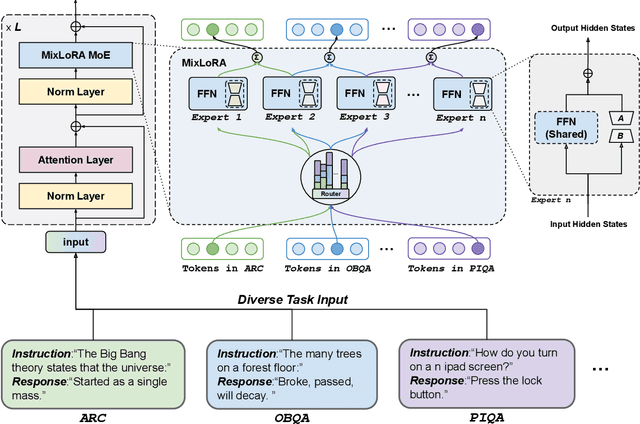


Abstract:Large Language Models (LLMs) have showcased exceptional performance across a wide array of Natural Language Processing (NLP) tasks. Fine-tuning techniques are commonly utilized to tailor pre-trained models to specific applications. While methods like LoRA have effectively tackled GPU memory constraints during fine-tuning, their applicability is often restricted to limited performance, especially on multi-task. On the other hand, Mix-of-Expert (MoE) models, such as Mixtral 8x7B, demonstrate remarkable performance across multiple NLP tasks while maintaining a reduced parameter count. However, the resource requirements of these MoEs still challenging, particularly for consumer-grade GPUs only have limited VRAM. To address these challenge, we propose MixLoRA, an innovative approach aimed at constructing a resource-efficient sparse MoE model based on LoRA. MixLoRA inserts multiple LoRA-based experts within the feed-forward network block of a frozen pre-trained dense model through fine-tuning, employing a commonly used top-k router. Unlike other LoRA based MoE methods, MixLoRA enhances model performance by utilizing independently configurable attention-layer LoRA adapters, supporting the use of LoRA and its variants for the construction of experts, and applying auxiliary load balance loss to address the imbalance problem of the router. In experiments, MixLoRA achieves commendable performance across all evaluation metrics in both single-task and multi-task learning scenarios. Implemented within the m-LoRA framework, MixLoRA enables parallel fine-tuning of multiple mixture-of-experts models on a single 24GB consumer-grade GPU without quantization, thereby reducing GPU memory consumption by 41\% and latency during the training process by 17\%.
ASPEN: High-Throughput LoRA Fine-Tuning of Large Language Models with a Single GPU
Dec 05, 2023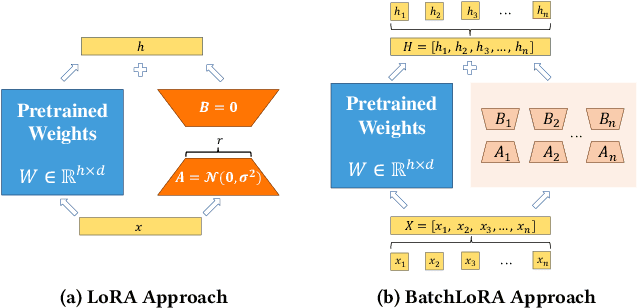
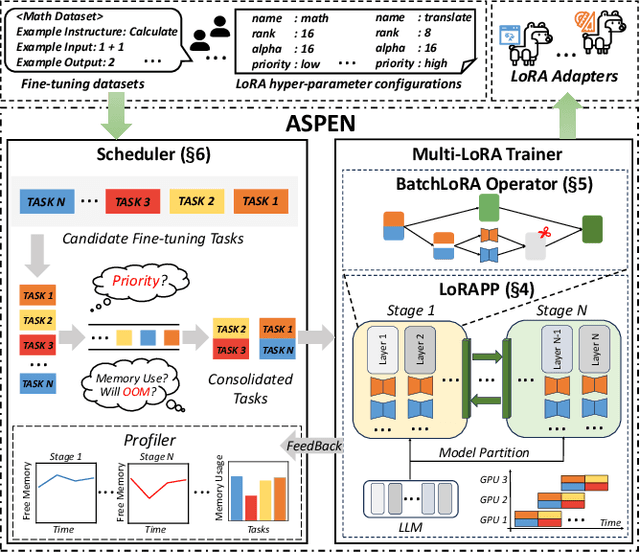
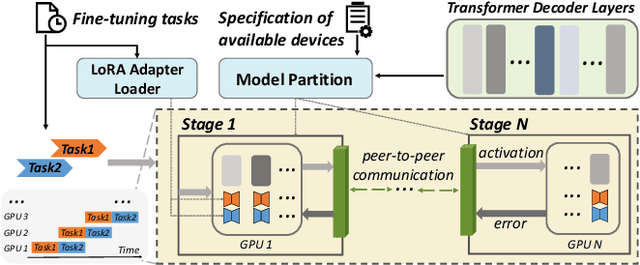
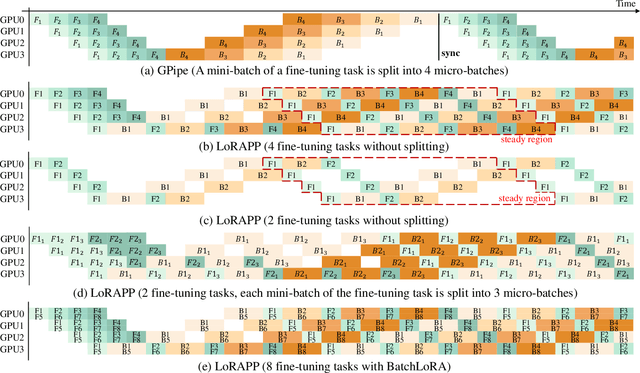
Abstract:Transformer-based large language models (LLMs) have demonstrated outstanding performance across diverse domains, particularly when fine-turned for specific domains. Recent studies suggest that the resources required for fine-tuning LLMs can be economized through parameter-efficient methods such as Low-Rank Adaptation (LoRA). While LoRA effectively reduces computational burdens and resource demands, it currently supports only a single-job fine-tuning setup. In this paper, we present ASPEN, a high-throughput framework for fine-tuning LLMs. ASPEN efficiently trains multiple jobs on a single GPU using the LoRA method, leveraging shared pre-trained model and adaptive scheduling. ASPEN is compatible with transformer-based language models like LLaMA and ChatGLM, etc. Experiments show that ASPEN saves 53% of GPU memory when training multiple LLaMA-7B models on NVIDIA A100 80GB GPU and boosts training throughput by about 17% compared to existing methods when training with various pre-trained models on different GPUs. The adaptive scheduling algorithm reduces turnaround time by 24%, end-to-end training latency by 12%, prioritizing jobs and preventing out-of-memory issues.
 Add to Chrome
Add to Chrome Add to Firefox
Add to Firefox Add to Edge
Add to Edge